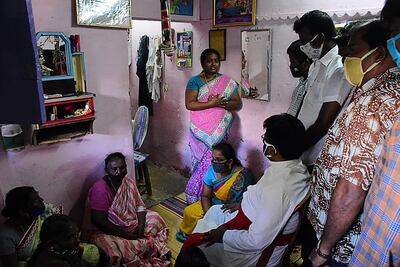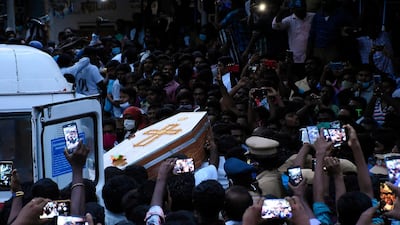Five Indian policemen have been arrested more than two weeks after they allegedly tortured a father and son to death in custody, sparking nationwide protests against police brutality.
P Jayaraj, 59, and his son Benicks Emmanuel, 31, were arrested last month for allegedly keeping their shop open beyond the permitted timings during the coronavirus lockdown in the coastal town of Tuticorin, in Tamil Nadu state.
But the pair died three days later in custody after they were allegedly sexually abused and beaten for hours by policemen in a state that is infamous for custodial deaths.
"Police have murdered them … they brutally killed them," Vinoth Kumar, Jayaraj's son-in-law, told The National.

The policemen's arrests came after state’s high court censured the authorities as public pressure mounted against the government’s reluctance to charge the policemen over the deaths. A woman head constable at the station told the court she saw her colleagues carrying out the assault.
A police inspector, two sub-inspectors and two constables have now been arrested on charges of murder. The policemen were initially suspended, a customary practice across India to placate public anger.
The police arrested Jayaraj on June 19 and forcibly took him to the police station, and when his son went to bail him out, he too was detained.
They were then brutally tortured throughout the night, particularly Emmanuel, who had tried to protect his father from the policemen, according to the family. Medical reports and witness accounts said the men were sodomised and beaten with sticks.
“There was not a part in their body that wasn’t red and swollen. Their backs were broken … they were beaten up mercilessly. I cannot even imagine the pain and torture they suffered,” Mr Kumar said.
Jayaraj and Emmanuel were taken to a state-run hospital the next morning after suffering from severe bleeding. Family members said the police did not allow them to see the two men at the hospital, but asked them for several changes of clothes because of the bleeding, before whisking them away.
“They were quickly taken to the magistrate and sent to a jail, where next day both died within hours of each other,” Mr Kumar said.
The deaths sparked anger and street protests in the small town and quickly attracted nationwide attention.
Activists and celebrities have campaigned on social media to demand justice for the duo as many drew comparisons with the custody death of George Floyd in the US that sparked a global outrage against police atrocities.
"Reeling from what I'm hearing. Absolutely stunned, sad and angry ... the guilty must not be allowed to go unpunished," tweeted Bollywood star Priyanka Chopra Jonas, as the hashtag #JusticeForJeyarajAndFenix was trending on Twitter.
India’s main opposition leader Rahul Gandhi condemned the killing, saying it is a "tragedy when our protectors turn into oppressors".
India's police have been widely criticised in recent months for their heavy-handed approach to enforcing the coronavirus lockdown, which involved the frequent use of violence to force people indoors, including public beatings. People were forced to crawl and hop along the street as a punishment for violating the lockdown.
Some say such actions are the result of an overstretched force and poorly trained officers. Police are known to often use violence to extract confessions from suspects or to deter criminals.
They are rarely held accountable or punished for these abuses.
Between April 2017 and February 2018, India recorded 1,674 custodial deaths, at an average of five per day, according to the latest available government figures. Tamil Nadu alone had 76 custodial deaths.
A report by a consortium of NGOs against custodial torture said 1,731 people died in police custody in 2019. It documented methods of torture that included hammering nails into the victim's body, rape with blunt objects, electric shocks to the genitalia and urination in the mouth.
India has yet to ratify the 1997 UN convention against torture, and is one of only nine countries that have no laws against torture.
“There is just no political will to take the needed and necessary measures to prevent torture,” said Devika Prasad, the head of Police Reforms programme of the Commonwealth Human Rights Initiative.

